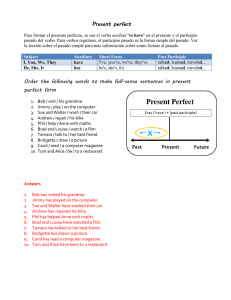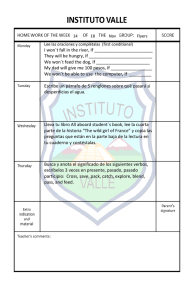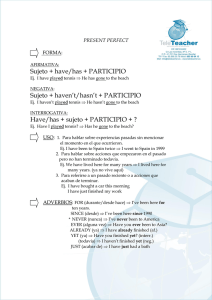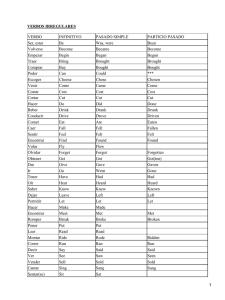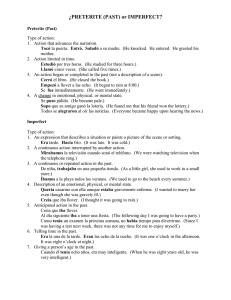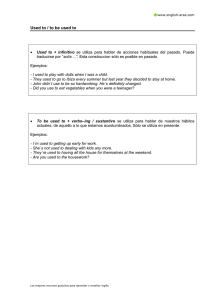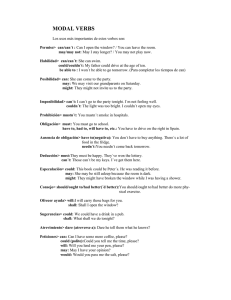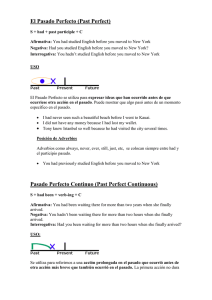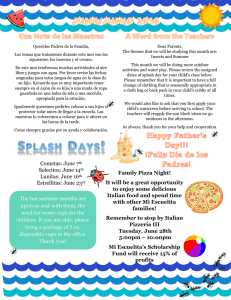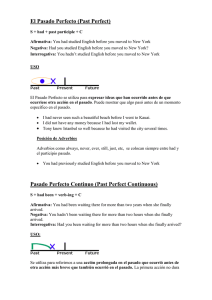Make one sentence by changing the sentence in italics into a
Anuncio
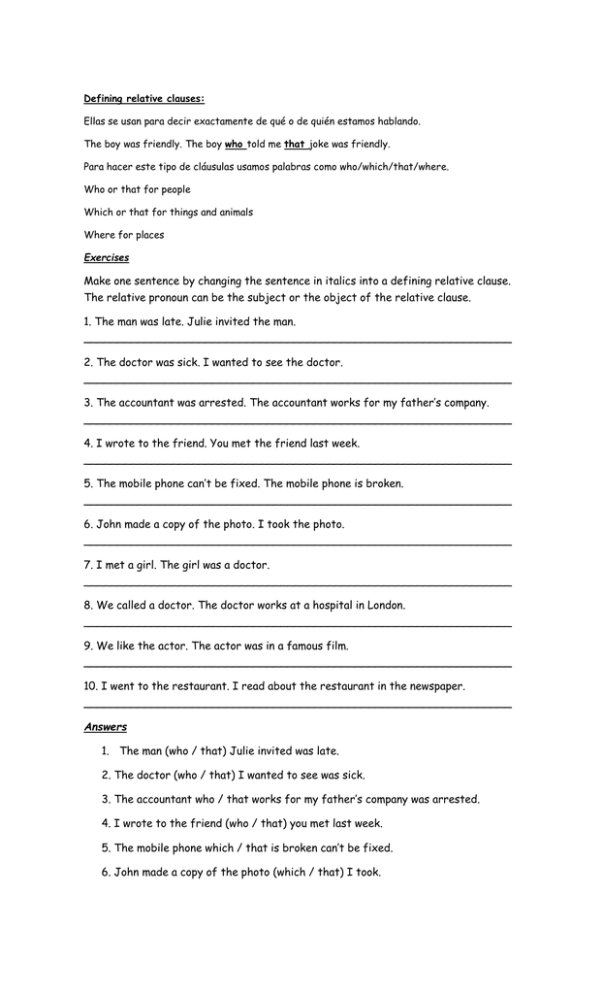
Defining relative clauses: Ellas se usan para decir exactamente de qué o de quién estamos hablando. The boy was friendly. The boy who told me that joke was friendly. Para hacer este tipo de cláusulas usamos palabras como who/which/that/where. Who or that for people Which or that for things and animals Where for places Exercises Make one sentence by changing the sentence in italics into a defining relative clause. The relative pronoun can be the subject or the object of the relative clause. 1. The man was late. Julie invited the man. _______________________________________________________________ 2. The doctor was sick. I wanted to see the doctor. _______________________________________________________________ 3. The accountant was arrested. The accountant works for my father’s company. _______________________________________________________________ 4. I wrote to the friend. You met the friend last week. _______________________________________________________________ 5. The mobile phone can’t be fixed. The mobile phone is broken. _______________________________________________________________ 6. John made a copy of the photo. I took the photo. _______________________________________________________________ 7. I met a girl. The girl was a doctor. _______________________________________________________________ 8. We called a doctor. The doctor works at a hospital in London. _______________________________________________________________ 9. We like the actor. The actor was in a famous film. _______________________________________________________________ 10. I went to the restaurant. I read about the restaurant in the newspaper. _______________________________________________________________ Answers 1. The man (who / that) Julie invited was late. 2. The doctor (who / that) I wanted to see was sick. 3. The accountant who / that works for my father’s company was arrested. 4. I wrote to the friend (who / that) you met last week. 5. The mobile phone which / that is broken can’t be fixed. 6. John made a copy of the photo (which / that) I took. 7. I met a girl who / that was a doctor. 8. We called a doctor who / that works at a hospital in London. 9. We like the actor who / that was in a famous film. 10. I went to the restaurant (which / that) I read about in the newspaper. USED TO Se usa cuando queremos hablar sobre una acción que sucedió regularmente en el pasado, pero que no sucede nunca más. My father used to smoke: my father smoked in the past, but he doesn’t smoke anymore. Rules: 1. Used to es seguido por una forma base del verbo principal. Example: Our town is used to be much smaller than it is now 2. La forma negative de used to es didn’t use to Example: I didn’t use to eat vegetables (en el pasado no comía vegetales, ahora si lo hago) 3. Se hacen preguntas con used to usando DID + SUBJECT + USE TO? Example: Did you used to live in London? Exercises: Make an affirmative sentence, negative sentence or question using ‘used to + infinitive’: 1. I / live in a flat when I was a child. _______________________________________________________________ 2. We / go to the beach every summer? _______________________________________________________________ 3. She / love eating chocolate, but now she hates it. _______________________________________________________________ 4. He / not / smoke. _______________________________________________________________ 5. I / play tennis when I was at school. _______________________________________________________________ 6. She / be able to speak French, but she has forgotten it all. _______________________________________________________________ 7. He / play golf every weekend? _______________________________________________________________ 8. They both / have short hair. _______________________________________________________________ 9. Julie / study Portuguese. _______________________________________________________________ 10. I / not / hate school. _______________________________________________________________ Answers: 1. I used to live in a flat when I was a child. 2. Did we use to go to the beach every summer? 3. She used to love eating chocolate, but now she hates it. 4. He didn’t use to smoke. 5. I used to play tennis when I was at school. 6. She used to be able to speak French, but she has forgotten it all. 7. Did he use to play golf every weekend? 8. They both used to have short hair. 9. Julie used to study Portuguese. 10. I didn’t use to hate school. SECOND CONDITIONAL Se usa el Segundo condicional para hablar sobre situaciones no reales in el presente o futuro. If I were a film star, I would live in a house in Hollywood. (No soy una Estrella de cine y no vivo en una casa en Hollywood). If clause Main Clause If + past simple Would/wouldn’t + main verb If my brother had more time He’d help me with my homework If jenny was older she’d leave school and get a job Podemos cambiar el orden de las dos partes si queremos: My brother would help me with my homework if he had more time. Cuando ponemos el “if” al principio, se escribe una coma después de este. Si ponemos el “would primero”, no hay que escribir con coma. La palabra “would” se puede abreviar (‘d), y la forma negativa sería “wouldn’t” PAST PERFECT Se usa este tiempo cuando se quiere hacer notar que una acción pasó antes que la otra en el pasado. When I arrived at Jim’s house, the party had started. (La fiesta comenzó antes que yo llegara). El pasado perfect ose forma con “had/ hadn’t (hadn’t)”. + e l pasado participio del verbo principal (tercera columna de verbos). Cuando usamos palabras como “before” y “after” en el pasado no es necesario usar pasado perfecto porque ellas dejan a la vista qué acción sucedió primero. The party started before I arrived or We got to the train station after the train left. REPORTED STATEMENTS Se usa para reportear lo quelaguin dijo en el pasado. Se usan principalmente verbos como “said and told”. “I’m hungry”, my sister said. My sister said she was hungry. Podemos usar la palabra “that” entre said or told (me) y el resto de la oración o podemos sacarla. I said that I didn’t want a hamburger. OR I said I didn’t want a hamburger Direct speech Reported statements Present simple Past simple Past simple Past perfect Present perfect Past perfect Am/is/are going to was/were going to Can/ can’t could/couldn’t Will/won’t would/wouldn’t Exercises Change this direct speech into reported speech: 1. “He works in a bank” She said ___________________________________________________________ 2. “We went out last night” She told me ________________________________________________________ 3. “I’m coming!” She said ___________________________________________________________ 4. “I was waiting for the bus when he arrived” She told me ________________________________________________________ 5. “ I’d never been there before” She said ___________________________________________________________ 6. “I didn’t go to the party” She told me ________________________________________________________ 7. “Lucy’ll come later” She said ___________________________________________________________ 8. “He hasn’t eaten breakfast” She told me ________________________________________________________ 9. “I can help you tomorrow” She said ___________________________________________________________ Answers 1. She said (that) he worked in a bank. 2. She told me (that) they went (had gone) out last night (the night before). 3. She said (that) she was coming. 4. She told me (that) she had been waiting for the bus when he arrived. 5. She said (that) she had never been there before. 6. She told me (that) she didn't go (hadn't gone) to the party. 7. She said (that) Lucy would come later. 8. She told me (that) he hadn't eaten breakfast. 9. She said (that) she could help me tomorrow. THIRD CONDITIONAL Es usado para hablar sonre cosas imaginarias en el pasado, para arrepentimientos y criticas. If you had told the teacher, she wouldn’t have been angry. (No le dijiste a la profesora, y ella se enojó) Este condicional tiene dos partes. If clause Main Clause If+ past perfect would have/wouldn’t have + main verb If my brother had told me, I’d had known If the team hadn’t played so badly they wouldn’t have lost También se puede cambiar el orden de las clausulas si quieres.
